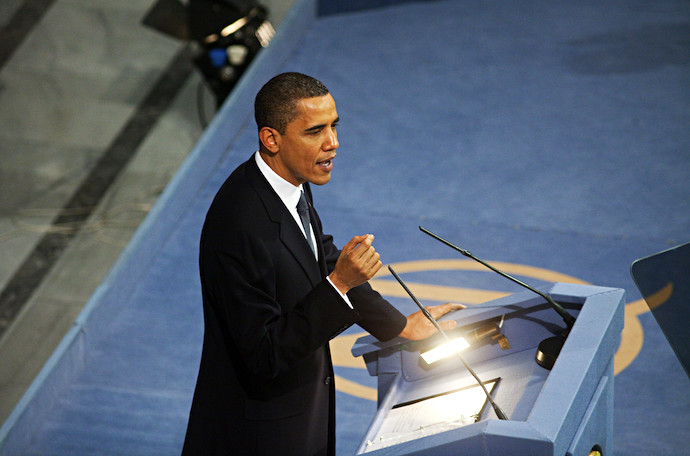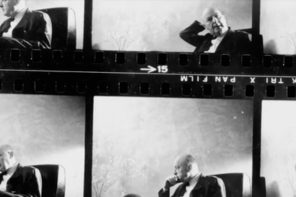There was a 500-pound paradox sitting in the room at Oslo City Hall. How else to describe awarding President Obama the Nobel Peace Prize just days after escalating the Afghanistan war? As with other controversies (e.g., see his commencement speeches at Arizona State and Notre Dame), Obama addressed the issue head on. This time he did so by engaging traditional dichotomies: between politics and morality, war and peace, realism and idealism. At West Point, we saw more of the former, in each of these pairings, than the latter. The Oslo speech reconciled the contradictions in ways, some have noticed, that reveal Obama’s influence by twentieth century theologian Reinhold Niebuhr. But how far will Obama’s Niebuhrian influence take him?
Pursuit of Peace through Force
At West Point, Obama sounded pragmatic, shrewd—like a realist. He affirmed “that it is in our vital national interest to send an additional 30,000 U.S. troops to Afghanistan,” while rejecting “nation building” as an unnecessary goal. Political realism presumes that nations do not go to war for primarily moral reasons. Lincoln, for example, saw his duty in the Civil War as preventing secession: “What I do about slavery and the colored race, I do because it helps to save the Union.” Franklin Roosevelt disapproved the proposal of bombing concentration camps or rail lines for practical reasons. His strategy: win the war, that will end the Holocaust.
Sure, Obama began by invoking the moral legitimacy of the initial invasion and closed by inverting the classic realist refrain: “right makes might.” These were moral bookends, though, to an essentially political argument: critics of the speech complained that he downplayed Afghans’ liberation from the Taliban and the US commitment to human rights.
In Oslo, however, Obama full-throatily discussed the moral valence of war, the pursuit of peace through force, and the noble causes American wars have defended. He forcefully affirmed that some evils—Nazism, al-Qaeda—require coercive force to confront. Speaking especially to Europeans, Obama left no room for presidential pacifism. (The German Marshall Fund reported that over 70% of Europeans disagree—about 50% strongly—that war sometimes is necessary to achieve justice.) He lamented that “in many countries there is a deep ambivalence about military action today, no matter what the cause. And at times, this is joined by a reflexive suspicion of America, the world’s sole military superpower.” Like Niebuhr, Obama recognized that even coercion short of war is constitutive of politics: “Those who claim to respect international law cannot avert their eyes when those laws are flouted.” He was also speaking here to Iran and North Korea.
Obama, Niebuhr, and Just War?
Most notably, Obama invoked “Just War” four times—more than any president since George H. W. Bush authorized the Persian Gulf War (which Obama also commended). Obama rattled off just war criteria such as last resort, proportional use of force and then memorably insisted, “There will be times when nations—acting individually or in concert—will find the use of force not only necessary but morally justified.” Iraq received no mention in the entire speech.
But while Obama and Niebuhr certainly share a belief that war sometimes is “morally justified,” Niebuhr was a frequent critic of much Just War thinking. His anti-pacifist critiques helped spark the rebirth of Just War ideas in America, but Niebuhr had his own distinctive Christian realist approach to war, which understood how the political causes of war were linked to underlying moral problems. Lincoln, recall, was convinced that slavery somehow was the cause of war. It’s fair to say the same of Nazism. For Niebuhr, the moral dimensions of war are every bit as “real” and vital as the security interests to which they are tied. Niebuhr never much liked just war’s “elaborate formulas,” instead embracing a “Christian principle” that justified force “to defend the victims of wanton aggression, or to secure freedom for the oppressed”—if not both.
Within this framework, one can appreciate how forces threatening US security historically have placed their own people under the lash. It is no coincidence, then, that the Civil War put an end to slavery, World War II shut down the concentration camps, or Operation Enduring Freedom abolished the Taliban’s repressive rule. Indeed war’s moral legacies often outlast the political causes. Such ethically grounded realism certainly transcends what Obama called the false choice between realism and idealism. But it also may undercut his more delimited just war embrace.
Revitalizing Ethical Realism
What follows from this ethical realist analysis? First, we should reassess the West Point speech. Bush devotees condemned the president for striking an ambivalent tone, for embracing “balance” among competing goods, and for not sounding moralistic as Bush sometimes was. But Obama’s surge announcement—in title, format, and focus—strikingly resembles Bush’s Iraq surge speech, emphasizing the practical and political (not moral) considerations of their decisions.
The ambivalence Obama captured was Niebuhrian in its understanding that war is an “expression of human folly”—a deeply flawed instrument that promises, at best, only relative justice. As the examples of Lincoln and Roosevelt show, war involves tragic choices and compromises. Against the ethical backdrop of Oslo, the West Point speech shows there is more than one way to be a wartime president. But it also locates Obama in good company among greats such as Lincoln and Roosevelt.
Secondly, Niebuhr’s ethical realism centered on security concerns but always understood the deeper moral issues beneath. God willing, Obama will never have to use force against Iranian or North Korean nuclear facilities, but this is no cause to overlook the misery these nations bring their people. There are also moral responsibilities in war—like those that come from invading a country and overthrowing its government. The US may have been in Afghanistan for eight years, but it never committed the resources to succeed. Obama, following Niebuhr, reminds us we are not as innocent as we think; amending for previous mistakes requires showing Afghans the US is serious about earning—quickly, one hopes—the right to withdraw.
Finally, if Obama wants to root himself within the ethical realist tradition embodied by other US presidents, he eventually will acknowledge the moral legacy of his predecessor’s decisions in Afghanistan and, yes, even Iraq. That US national interests were not as imperiled in Iraq as many contended proves the Iraq War something of an outlier. Time will tell, but we should not be surprised by the impact of Saddam Hussein’s ouster as a defining moment in Iraq’s new national history and emerging identity. For a war’s moral legacy, as often happens, surpasses its original causes.



